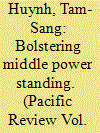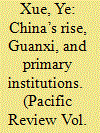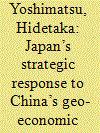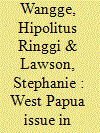|
|
|
Sort Order |
|
|
|
Items / Page
|
|
|
|
|
|
|
| Srl | Item |
| 1 |
ID:
190654


|
|
|
|
|
| Summary/Abstract |
South Korea's reluctant response to the U.S. Free and Open Indo-Pacific (FOIP) strategy so far has failed to send a clear-cut signal to regional countries. Despite upholding multilateralism as the cornerstone of its middle power diplomacy, South Korea has not worked in line with Indo-Pacific second-size powers given Seoul's relatively vague response to the Indo-Pacific structure. With foreign policy shifts from Trump to Biden, South Korea may be well-positioned to communicate its policies with a more nuanced response to the Indo-Pacific. To leverage Seoul's middle power standing and its commitment to multilateralism, the Moon Jae-in administration can be expected to reflect on clearer definitions of what 'Indo-Pacific' means and come up with a more comprehensive understanding of multilateral cooperation in the region so as not to mistake 'Indo-Pacific' for its security connotation. As for South Korea, pursuing a three-headed strategy, for example, continuing to position itself in the Indo-Pacific region as a balancer, enhancing ties with like-minded middle powers, and deepening the South Korea-ASEAN relationship, could accommodate Seoul's interests and concerns amid the U.S.–China strategic competition and the COVID-19 pandemic.
|
|
|
|
|
|
|
|
|
|
|
|
|
|
|
|
| 2 |
ID:
190653


|
|
|
|
|
| Summary/Abstract |
This article focuses on how China views the normative structure of the international order. It integrates the Chinese cultural idea of guanxi into the established English School tradition in International Relations theory and argues that the norm of guanxi is an emerging pluralist primary institution. In this article, the author first presents the emergence of guanxi as a purposive norm in China’s foreign policy, and the interplay of this norm between China and other international actors. Second, the article scrutinizes the establishment of secondary institutions reflecting the norm of guanxi. Third, this article discusses how this primary institution has been consolidated at regional and global levels. In conclusion, this article briefly draws on two major developments of international politics: the cultural diversity of the international order and the emergence of a China-centred international society.
|
|
|
|
|
|
|
|
|
|
|
|
|
|
|
|
| 3 |
ID:
190657


|
|
|
|
|
| Summary/Abstract |
For the Association of Southeast Asian Nations (ASEAN), the South China Sea (SCS) disputes between China and Southeast Asian claimant states (Vietnam, the Philippines, Malaysia, and Brunei) are a major concern. However, the dominant sceptics are pessimistic about ASEAN’s effectiveness in managing these disputes. This article contributes to the field by providing a systematic analysis on this topic, which is missing within the literature. Also, many of the arguments presented in this article challenge the dominant views and thus provide an alternative understanding of ASEAN’s effectiveness in managing the disputes. The arguments are as follows: First, ASEAN members do have shared interests and a common policy regarding managing the disputes. Second, China’s influence on individual ASEAN members is not as strong as the sceptics often argue. Third, the degree of ASEAN’s goal attainment is medium because it achieved essential goals while conceding important but non-essential ones. Fourth, compared with a legalistic and adversarial posturing approach, ASEAN’s approach is more effective in managing these disputes.
|
|
|
|
|
|
|
|
|
|
|
|
|
|
|
|
| 4 |
ID:
190660


|
|
|
|
|
| Summary/Abstract |
Japan has historically been a major player within the Indo-Pacific region due to its rapid post-war economic expansion, technological advancement, massive overseas development aid as well as its cultural outreach. As the Indo-Pacific today is marred with various challenges in the form of maritime and energy security, border conflicts, booming population, developing economies, and rising carbon emissions, among others. The region requires a multipolar balance of power wherein nations can lead by example and concerted action towards creating a peaceful, prosperous and sustainable future for an extensively dynamic Indo-Pacific. This paper focuses on one of the critical variables of the region, i.e., the energy sector, and attempts to place Japan’s role and contribution to the region’s ongoing energy transitions. The extent and means through which Japan can propel itself and the region towards a just transition with the help of regional and international cooperation have been analysed.
|
|
|
|
|
|
|
|
|
|
|
|
|
|
|
|
| 5 |
ID:
190658


|
|
|
|
|
| Summary/Abstract |
In the new millennium, Japan found a renewed interest in infrastructure investment and engaged in this policy issue with diplomatic initiatives and external partnerships with due attention to China’s geo-economic presence. In formulating strategies for infrastructure investment, Japan has presented and disseminated a specific idea of ‘quality infrastructure’ as a principal component of its external infrastructure push. This article seeks to trace the evolution of Japan’s ideational principles for quality infrastructure and elucidate policy motivation, policy objective, and external influence. It argues that Japan’s advocacy of quality infrastructure derived from domestic impetus to expand infrastructure exports and external impetus to compete against China’s infrastructural push through the Belt and Road Initiative (BRI). Japan advocated quality infrastructure as a strategic tool to pursue multiple policy objectives that shifted from justifying Japanese infrastructural push to using as means to check and accommodate the BRI, and to legitimising common governance principles for infrastructure investment. In relations to external influence, Japan’s persistence in norm-setting encouraged China to incorporate normative principles first at business dialogues and then embed common governance principles in its policy approach to infrastructure investment.
|
|
|
|
|
|
|
|
|
|
|
|
|
|
|
|
| 6 |
ID:
190656


|
|
|
|
|
| Summary/Abstract |
This article examines the role of international intervention for refugee protection by conducting a within-case analysis of two similar groups in China: Vietnamese and North Korean refugees. It argues that states make refugee policy decisions based on cost-benefit calculations, but this self-centered behavior can be mitigated by international intervention. Without amending national laws and official policies, the international community can improve refugee protection in authoritarian regimes through external assistance and support that shares and reduces the burden on host states and persuades state behavior toward refugees. The evidence of this study further suggests that international intervention matters, but the formats of intervention are even more critical to improving a state’s refugee protection, especially in dealing with a powerful authoritarian state like China in the context of the Post-Cold War era. More specifically, positive inducements are preferable than sanctions and criticism to address China’s human rights violations regarding North Korean refugees because the strategies help China to leverage its power in the Korean peninsula and the Asian region more broadly by providing them enough political coverage to save its face from allies and constituents and maintain close diplomatic relationships with its all neighbors, including the two Koreas.
|
|
|
|
|
|
|
|
|
|
|
|
|
|
|
|
| 7 |
ID:
190659


|
|
|
|
|
| Summary/Abstract |
The Anthropocene is an emerging concept that defines the challenges for international relations due to human activity altering the Earth on a planetary scale. The debates around the Anthropocene as a study of international relations are in infancy without a comprehensive theory to articulate its ramifications on the foreign and security policies of nation-states. This study aims to examine the challenges and opportunities posed for Taiwan in the Anthropocene. The research concludes that the Taiwanese foreign and security policy in the Anthropocene can find opportunities by seeking new social, economic, and political alliances as proposed by the Shelter Theory. These opportunities could help mitigate the dangers of this new phenomenon and allow Taiwan to reach its economic and foreign policy aims without exposing itself to future shocks.
|
|
|
|
|
|
|
|
|
|
|
|
|
|
|
|
| 8 |
ID:
190655


|
|
|
|
|
| Summary/Abstract |
Pacific island countries have paid increasing attention to the situation in Indonesia’s easternmost provinces of Papua and West Papua (commonly referred to collectively as West Papua) in recent years, prompted mainly by continuing human rights abuses as well as the more general political and economic marginalization of indigenous West Papuan people since integration with Indonesia in 1969. This article addresses some key questions concerning Indonesia’s failure to deal effectively with the issue. Against a background of reactionary hypernationalism on the one hand, and a rhetorical anti-colonial internationalism on the other, domestic policy with respect to the treatment of indigenous West Papuans has, for the most part, seen a continuation of repressive authoritarian measures. And in responding to international criticisms, foreign policy has been poorly handled. There has been a lack of serious engagement with human rights issues as reflected in ongoing denial of abuses in the provinces and a generally reactive and defensive foreign policy approach. At a bureaucratic level, there is little coordination between the Ministry of Foreign Affairs and other ministries with responsibilities for West Papua, and therefore no effective basis on which to build a coherent policy response. Another problem consists in Indonesia’s often clumsy public diplomacy in the Pacific islands region. As a consequence, the West Papua issue continues to grow in prominence in Pacific regional politics and beyond.
|
|
|
|
|
|
|
|
|
|
|
|
|
|
|
|
|
|
|
|
|